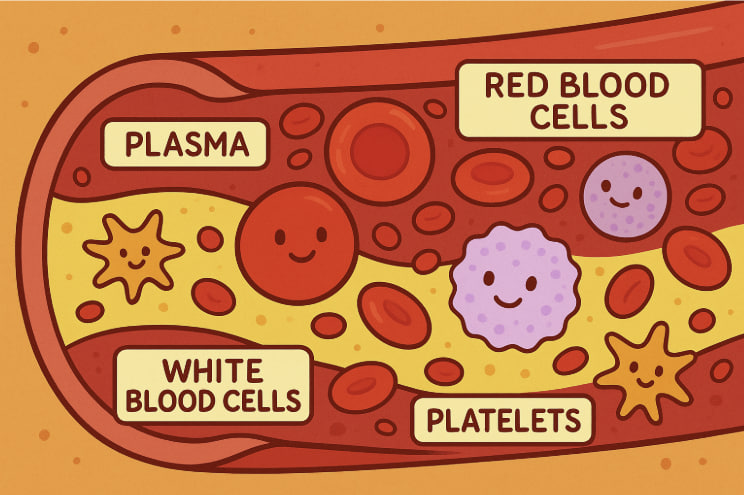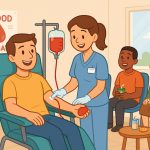Blood is a vital fluid that circulates throughout the body, delivering oxygen and nutrients to tissues, removing waste, and defending against infection. It is essential to life and plays a central role in every bodily function — from breathing and digestion to immunity and healing.
What Is Blood Made Of?
Blood is composed of four main components:
- Red blood cells (RBCs) – Carry oxygen from the lungs to the body and return carbon dioxide for exhalation.
- White blood cells (WBCs) – Protect the body from infection and are part of the immune system.
- Platelets – Help stop bleeding by forming clots at injury sites.
- Plasma – The liquid part of blood (about 55%), carrying nutrients, hormones, and waste products.
Each component has a specific function and can be separated for medical use in transfusions and treatments.
The Circulatory System
Blood moves through a closed system of arteries, veins, and capillaries with the heart acting as the central pump. This circulation ensures every cell in the body gets the oxygen and nutrients it needs.
The system also helps regulate body temperature, pH levels, and the transport of hormones to target organs.
Blood Types and Compatibility
There are four main blood groups: A, B, AB, and O, each with an Rh factor (positive or negative). These types are determined by the presence or absence of antigens on red blood cells.
- O-negative is the universal donor.
- AB-positive is the universal recipient.
Knowing your blood type is crucial for safe transfusions, surgeries, and emergencies.
Functions of Blood
- Transportation: Carries oxygen, nutrients, hormones, and waste.
- Protection: WBCs fight infections and foreign invaders.
- Clotting: Platelets form clots to stop bleeding.
- Regulation: Maintains body temperature, pH, and fluid balance.
Blood also plays a role in immune response, inflammation, and wound healing.
Blood and Health
Healthy blood is key to overall well-being. Conditions like anemia, leukemia, clotting disorders, and infections affect blood and can be life-threatening if untreated.
Regular blood tests can reveal vital health indicators, such as cholesterol levels, infections, organ function, and nutrient deficiencies.
Glossary
- Red blood cells (RBCs) – Cells that carry oxygen through the body.
- White blood cells (WBCs) – Immune system cells that fight disease.
- Platelets – Tiny cell fragments that help form clots.
- Plasma – The fluid part of blood containing proteins, nutrients, and hormones.
- Antigens – Molecules on blood cells that determine blood type.


